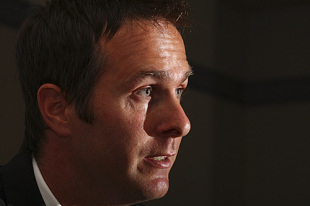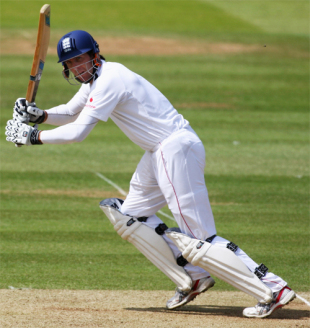Losing the X factor
Michael Vaughan

|
|||
|
Related Links
Players/Officials:
Michael Vaughan
Teams:
England
|
|||
On a Monday morning in July 2003 I walked through the gates at Edgbaston, and Nasser Hussain asked: "Can I have a word with you?" He then took me to a small place near the England dressing-room.
"Do you fancy being England captain?" Nasser asked. "Absolutely!" I replied.
On the Wednesday at Lord's I put on my England cap and blazer to be photographed in the Long Room, and on the Thursday I was leading the team out. When I was young I dreamed about making hundreds for a winning England side, but I hadn't thought about being the England Test captain until I took over the one-day team after the World Cup.
It was quite good it happened so quickly. I'd had limited experience of captaincy with England A, and had started to build a team during the one- day series against Pakistan which we won. I also had the advantage of a good tour of Australia the previous winter when I could see the changes that needed to be made. After the Lord's Test I talked with Duncan Fletcher and began to put the building blocks in place to win the 2005 Ashes series.
One of the big things I wanted was for the England players to think about the game. I had always looked at the Australians and they all seemed to be thinking about how to win. I wanted every England player to be a captain, with freedom of speech on the field and in the dressing-room. I also wanted the team to enjoy playing: they have enough pressure on them from the media and supporters, and I wanted to take it off them and allow them to play instinctively. In my experience the people who play instinctively under pressure are the most dangerous.
When you start as a captain you have to learn from your mistakes. I made mistakes during my first Test series against South Africa, but I learned from them and gained a lot of confidence. In the Oval Test, as the first day drew to a close, they were 362 for three; but we changed our plans and field- placings, tried some short stuff, went over and round the wicket, and bowled them out for 484. We won the Test and drew the series 2-2 - against South Africa, and they were a really good team.
A lot of captaincy is about acting: you want your team-mates to play naturally and be themselves, but the captain has to act. Your job is to lead with a calm authority. On that Sunday morning at Edgbaston in 2005 when we won the Second Test against Australia by two runs, I was unbelievably stressed. I was flapping like hell inside, but couldn't show it.
I always tried to put myself in the position of the players and think about what they wanted to hear. Sometimes it has to be harsh words; sometimes you have to pick them up. But whatever it is, you have to speak naturally and be consistent. You have to make them feel comfortable and wanted, especially a new player. No way can you arrive in the breakfast room or dressing-room and show the team that you are feeling bad. If you get nought, they don't want to see you sulking for three or four hours; you have got to go and sit on the balcony and front up. The players in my last year as captain didn't know I was struggling - and that is one of the things I will always be proudest of.
| I always tried to put myself in the position of the players and think about what they wanted to hear. Sometimes it has to be harsh words; sometimes you have to pick them up. But whatever it is, you have to speak naturally and be consistent. | |||
Cricket is all about decision-making. As a batsman you have to make a decision every ball you face, and a captain has to make decisions all the time. Do you bat or bowl first? What's the batting order? Which bowlers do you put on and what about the field-placings? Do you change something so you are three or four overs ahead of the game, or do you let it go and perhaps allow the game to drift? For three-quarters of the time I was England captain I was 100% confident in my decision-making and didn't give a monkey's about what anybody thought.
As soon as you get the job of England captain, more people recognise you. After winning the Ashes it went up another notch, and after my final press conference at Loughborough it went up another notch. The TV cameras are constantly on you in the field or even sitting on the balcony, or doing interviews at the start or after the game. Your actions in public have to be more careful; you can't be Jack the Lad. But it is very nice when a young lad or an old person comes up to you and talks because it means people are watching cricket.
The biggest perk of being the England captain is knowing you are leading your country. On the England team-sheet it would say "Michael Vaughan (captain)". I got invited to lunch with the Queen and sat around the table at Buckingham Palace for a good couple of hours - I never feel nervous in situations like that. It is only since finishing the captaincy that I have really had time to meet famous people from other sports.
I wasn't very good at switching off. I thought about the captaincy 24/7 and that is why it took its toll. There is always going to be some negative stuff, like whether you are going to tour Zimbabwe or not, and how you cope decides how long you can captain for. Even in the year out with my knee injury I was still thinking about how to make us a great team. Even when playing golf, after two or three holes I'd get back to strategies for beating Australia and what sort of cricket we had to play. When I first talked with Duncan Fletcher after that Lord's Test in 2003, we discussed the style of cricket we had to play before picking the team. It had to be an attacking style: that's why we picked Kevin Pietersen in 2005 to play Shane Warne.

|
|||
Normally when I was England captain I was that tired after a day's play that about 10.30 I would read a couple of paragraphs of a book, put my head on the pillow and wake up about 6.30. In the 2005 series I'd wake up during the night and think, not about the captaincy, but about the game we were playing. Duncan and I had a fantastic relationship. David Graveney always allowed us to get on with it, but he had advice if we wanted, and we had identified a good group of players who could play an attacking style and make their own decisions. I must add that a captain is only as good as his players, and to win the Ashes you must have some great ones.
I honestly thought we had won the Ashes at Trent Bridge after going 2-1 up. I knew it for certain on that Monday afternoon at The Oval after KP and Ashley Giles had put on about 50 to make the draw certain. It wasn't the work of three or four months but two years of putting that team together. We had played such an attacking game, and every game was so close, that when we won the Ashes it was the most draining emotion. Dealing with the media was one of the best parts of the job. It got me down in the end, but in general I liked going to press conferences, and talking to TV when doing the toss and putting on a positive spin, or doing interviews after the game. I would love to do that part of the job again. In a strange way I found it more difficult to explain the good times and the victories than the defeats. I said that for three-quarters of my time I didn't worry about my decision- making. Towards the end, especially in the last series against South Africa, I started to question myself - and in sport, the more you start to think, the more you have a problem. I didn't want to go on as captain for a year too long.
Generally it is down to luck: you move a fielder wider at slip and the ball goes to him. Then something changes, and the ball goes between the fielders, and the sparkle goes and the X-factor disappears. In my last Test at Edgbaston, Graeme Smith was given not out when the TV replays showed he might have gloved Monty Panesar. In the first half of my captaincy that sort of decision had gone my way. When Mike Kasprowicz gloved one down the leg side off Steve Harmison on that Sunday at Edgbaston in 2005, Billy Bowden gave him out. Or if Ricky Ponting had chosen to bat first in that Test, that would have been luck again and the result could have been different. We would have gone 2-0 down and I would never have been installed as a great captain.
There is an egg-timer out there, and my time had run out.
Michael Vaughan led England in 51 Tests, winning 26, losing 11 and drawing 14. No other captain has taken England to more Test victories.

